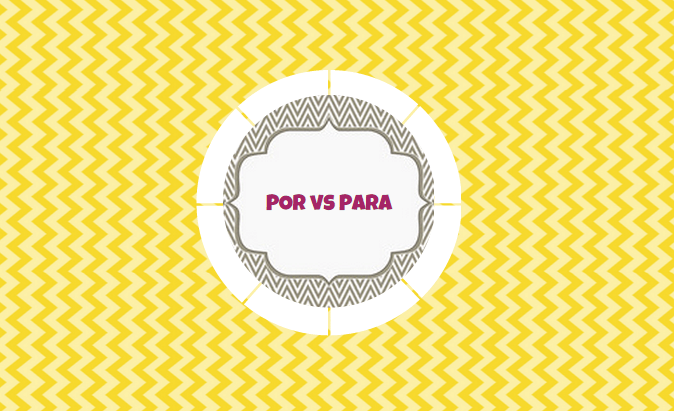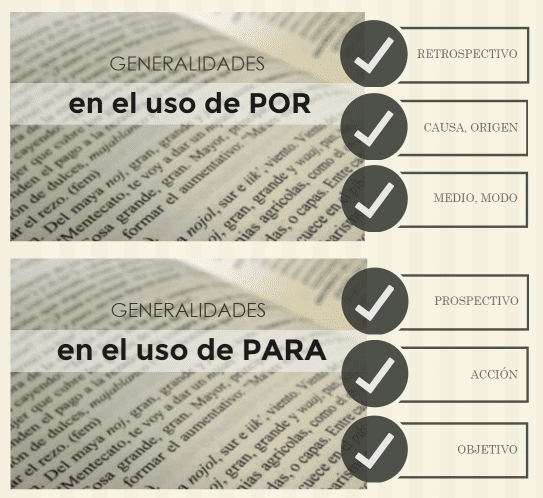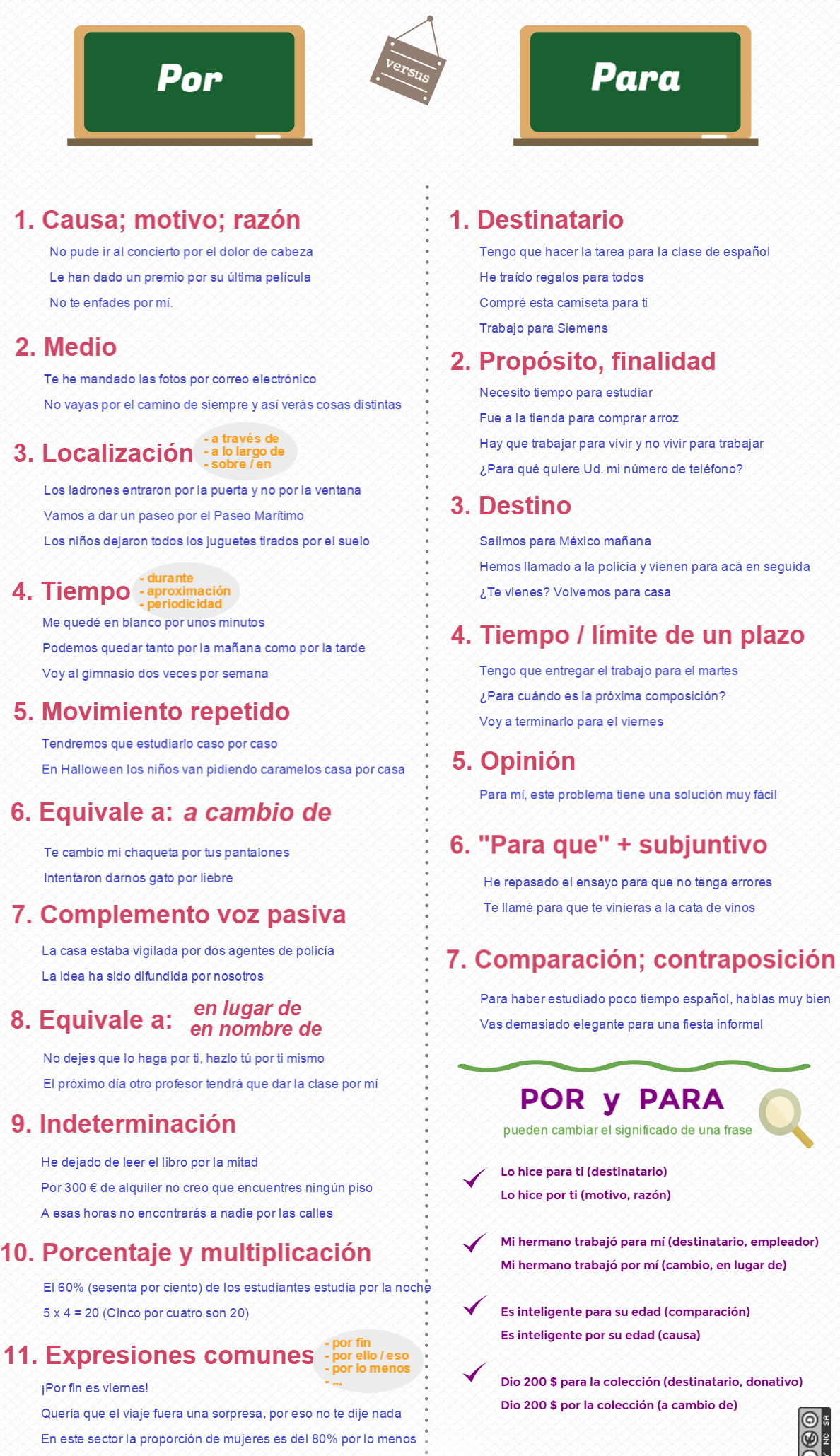Las preposiciones POR y PARA (por vs para)
13 April, 2015

Usos y expresiones con POR y PARA
Por y para son dos preposiciones que generan gran confusión al estudiante de español. Para poder utilizar con precisión las preposiciones por y para, es importante no reducirlas a una sola preposición. Esto ocurre en otros idiomas, como por ejemplo el inglés, que emplea generalmente for como equivalente de por y para. Recuerda que el aprendizaje y uso de las preposiciones es una de las mayores dificultades que toda lengua presenta, pues no siempre coinciden.
Para aprender a utilizar estas preposiciones (por vs para), es importante que sepas las funciones y usos que corresponden a cada una de ellas.
A modo de explicación general, te diremos que: por se refiere a la causa o razón de las cosas y para indica el propósito o destino de algo. Así, para tiene sentido de futuro o de objetivo mientras que por suele hacer referencia a algo retrospectivo o a la fuente/origen.

Esta oposición de prospectivo / retrospectivo puede ser un buen marco de referencia para llegar entender frases como:
– Lo hice para ti (I did it for you)
– Lo hice por ti (I did it because of you)
De todas formas, para un enfoque más práctico y exacto, deberás conocer los usos, funciones y expresiones idiomáticas más importantes de las preposiciones por y para (por vs para).

Finalmente te dejamos alguna práctica y expresiones idiomáticas. Recuerda que es muy importante practicar mucho, es la única forma de aprender un idioma.
Expresiones idiomáticas con POR:
– Por lo menos (at least):
Por lo menos no estoy solo. = At least I am not alone.
– Por los pelos (barely – lit. by the hairs):
Llegué a tiempo por los pelos. = I barely arrived on time.
– Por lo mismo (for that very reason):
Por lo mismo no te lo dije. = I did not tell you for that very reason.
– Por adelantado (in advance):
Tienes que pagar por adelantado. = You must pay in advance.
– Por lo tanto (therefore):
…por lo tanto la respuesta es no. = …therefore the answer is no.
– Por ahora (for now):
No tengo nada que decir por ahora. = I have nothing to say for now.
– Por lo visto (apparently):
Por lo visto, es enfermera. = Apparently, she is a nurse.
– Por lo que a mí me toca (as far as I am concerned):
Por lo que a mí me toca, el mayor problema es el idioma. = As far as I am concerned, the biggest problem is the language.
– Por ahí (around there):
Debe estar por ahí. = It should be around there.
– Palabra por palabra (word for word):
Tuve que repetirlo palabra por palabra. = I had to repeat it word for word.
– Por + adjetivo + que sea (however + adjective + it is):
Por sano que sea, no quiero comerlo. = However healthy it is, I don’t want to eat it.
– Por lo que he oído (judging by/according to what I have heard):
Por lo que he oído no es de España. = Judging by what I have heard she is not from Spain.
– ¡Por el amor de Dios! (For the love of God!)
– Por aquí (this way):
Podemos ir por aquí. = We can go this way.
– Por mi parte(for my part):
Por mi parte, prometo volver pronto. = For my part, I promise to come back soon.
– Por medio de (by means of):
Por medio de este artículo podrás aprender a usar por y para. = By means of this article you will learn how to use por and para.
– Por casualidad (by chance):
Lo encontré por casualidad. = I found it by chance.
– Por completo (completely):
Lo había olvidado por completo. = I had completely forgotten about it.
– Por cierto(by the way):
Por cierto, ¿tienes más café? = By the way, do you have more coffee?
– Por ciento (percent):
El treinta por ciento de la gente no votó. = Thirty percent of the people did not vote.
– Por motivo de (on account of):
No fuimos por motivo de la lluvia. = We did not go on account of the rain.
– Por ningún lado(nowhere/anywhere):
No lo encuentro por ningún lado. = I can’t find it anywhere.
– Por un lado / por una parte (on the one hand):
Por un lado, ya es muy tarde. = On the one hand, it is already too late.
– Por otro lado / por otra parte (on the other hand):
Por otro lado, está lloviendo. = On the other hand, it is raining.
– Por eso (that’s why, therefore):
Por eso no puedes ir a la fiesta. = That’s why you cannot go to the party.
– Por poco (almost):
Por poco me caigo. = I almost fell.
– Por desgracia (unfortunately):
Por desgracia, ya se ha ido. = Unfortunately he has already gone.
– Por ejemplo (for example):
Tienes varias opciones. Por ejemplo, puedes ir en coche. = You have different options. For example, you can go by car.
– Por supuesto (of course):
Por supuesto que te quiero. = Of course I love you.
– Por favor (please):
La cuenta, por favor. = The bill, please.
– Por suerte (fortunately):
Por suerte estabas allí. = Fortunately you were there.
– Por si acaso (just in case):
Lo compré por si acaso lo necesitabas. = I bought it just in case you needed it.
– Por las buenas o por las malas (whether you like it or not):
Irás al dentista por las buenas o por las malas. = You will go to the dentist whether you like it or not.
– Por separado (separately):
No se venden por separado. = They are not sold separately.
– Por escrito (in writing):
Lo necesito por escrito. = I need it in writing.
– Por primera / última vez (for the first / last time):
Te lo digo por última vez. = I am telling you this for the last time.
– Por todas partes / por todos lados (everywhere):
Los juguetes están por todas partes. = The toys are everywhere.
– Por lo demás (apart from that):
Luis, por lo demás, no tienes que hacer nada más. = Luis, apart from that you don’t have to do anything else.
– Por lo general (generally):
No como plátanos, por lo general. = I generally don’t eat bananas.
– Por último (finally – in a series of events or steps):
Por último, añade la leche. = Finally, add the milk.
– Por fin (finally – when you were expecting something):
¡Por fin ha llegado! = He has finally arrived!
Expresiones idiomáticas con PARA:
– Para siempre (forever):
Estaremos juntos para siempre. = We will be together forever.
– Para arriba (up, upward, upstairs):
Sube para arriba y espérame allí. = Go upstairs and wait for me there.
– Para abajo (down, downward, downstairs):
De cintura para abajo, el vestido es muy bonito. = The dress is very pretty from the waist down.
– Para delante (forward):
Ve para delante porque no puedo ver nada. = Move forward because I can’t see a thing.
– Para atrás (backwards):
¡Échate para atrás! = Back off!
– Para entonces (by that time):
Para entonces ya era muy famoso. = He was very famous by that time.
– Para variar (for a change):
Podrías decir la verdad para variar. = You could tell the truth for a change.
– Ser tal para cual (to be two of a kind):
Michael y Maite son tal para cual. Siempre están escuchando música. = Michael and Maite are two of a kind. They are always listening to music.
¡Esto es todo! Esperamos haberte ayudado con tus dudas entre POR y PARA.
Si tienes cualquier duda, o quieres profundizar con tu aprendizaje de español, recuerda que puedes contar con nosotras.
¡Hasta pronto!

Teacher and Academic Manager at Aprende Hablando. My goal is to encourage all the students to reach their goals efficiently through the benefits of 1-on-1 courses, where each lesson is customized to the student’s needs and where the student has the unique opportunity for intensive practice.




